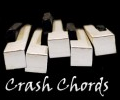Subscribe!
Look At The Things!
alternative hip hop alternative rock art rock burlesque comedy electronica events experimental folk folk rock funk hard rock heavy metal heavy rock hip hop indie pop indie rap indie rock interviews jazz metal movies music nerd nerdcore new wave nu metal podcaster podcasts pop pop punk pop rock post-rock progressive rock punk R&B rap rock synthpop techno tours / live shows tv video games writer writing
CCP Ep. #26: The Outtakes
Music Is Better Than Prozac… Or At Least I Think So by Joseph Matons
Good heavens, is there anything on God’s green Earth that can connect you more with your emotions than music? In times of joy, grief, trouble, or sorrow, is there ever a healthier outlet? When you’re sad, lonely, depressed, or just out-and-out disappointed with the world, isn’t it grand that (somewhere out there) there is a song that connects so profoundly with your current mood or situation? …That one song from that one album that just sums it up so perfectly!
Trigger Tracks: INSANITY
Our New “Podcast Archive” Page!
So, it would seem that we’re beginning to rack up a hefty number of podcasts. It’s been four months, and we’re about to hit Episode #20 this coming week! As for our new listeners, we encourage you to jump in wherever you like. After all, we’re most interested in what interests you! But with our growing backlogs of artists, albums, and topics, we understand that culling our “Podcast Category” page can seem a little daunting. This is why we’ve added a brand new Podcast Archive page, easily accessible just below our main banner for an at-a-glance look at all that we have to offer. (Believe me, when these numbers get higher, you’ll be glad it’s here.)
Record Review: Impossible Landscape by Children of Nova

Like many who dabbled with the game Rock Band a few years back, I was occasionally exposed to a few curious stand-outs, the ones who crept their way into the archives amidst the landmark crowd-pleasers of the last fifty years. One of these new and exciting bands was the Post-Prog wonder, Children of Nova. Their hits, “The Complexity of Light” and “Aracaedion,” weren’t just fun songs to rock out to in the game (though of course they still are); I personally found myself mesmerized at how simultaneously inventive and catchy they were, both on and off the Xbox, despite being relatively unknown.
Trigger Tracks: Longing
Song Scales: Steve
Each week, during the Crash Chords Podcast, Matt, Jon, and I task ourselves to an engrossing album review—usually ripe with vehement discourse, a heated exchange of opinions and observations, and a few revelations. Then, once all has been said, a fixed summation is usually warranted to close the book on the matter and call it a day. But the book is never quite closed, is it? That’s the wonderful thing about music (and art in general), that all it really takes for a work to gain someone’s favor is for that person to see it in a personal light. As long as it’s something provocative and close to home, anything has a chance at success. This is why, I believe, once our ratings have been spoken, they often result in a more generalized debate on the grounds with which we make such judgments, and the flexibilities we must grant.
Tragic Dead Ends (I): “Less of Progressive”

In Crash Chords Podcast #9, we looked at the pros and cons of Rock n’ Roll in its infant state through the lens of our album review, Take a Vacation! by The Young Veins. Though their work was dated as recent as 2010, they hearkened back to a much earlier incarnation of Rock, delivering unto us the carefree beach sounds of the early 60s once again. Though the album sparked an intriguing debate on how it should be rated, it was unanimously agreed upon that there is much to be owed to this early era, as a basis for modern instrumentation and common structural forms. But, as with a great many other things in the 1960s, Rock was inevitably on an unstoppable evolutionary track.
A Take on “Taste”
In determining our musical leanings, I put great stock into the constructs of our musical backgrounds. Almost irrefutably, the experiences we have with music in our pasts will determine the music we listen to in the future. “But wait, no!” you might say. “That can’t be true! Surely I’ve been lured by fresh artists into foreign genres before, some which I’d never have given a chance otherwise!” Well sure, we’ve all been there (and probably felt like quite the pioneer, haven’t we?), but in today’s modern society where genres are plentiful and tastes subjective, it can be interesting to ask ourselves from time to time a variety of questions. Under what pretenses do we make these choices? What defines our threshold for acceptance vs. rejection? More fundamentally, what is it that makes our back-hair stand on end, and where does it come from?










